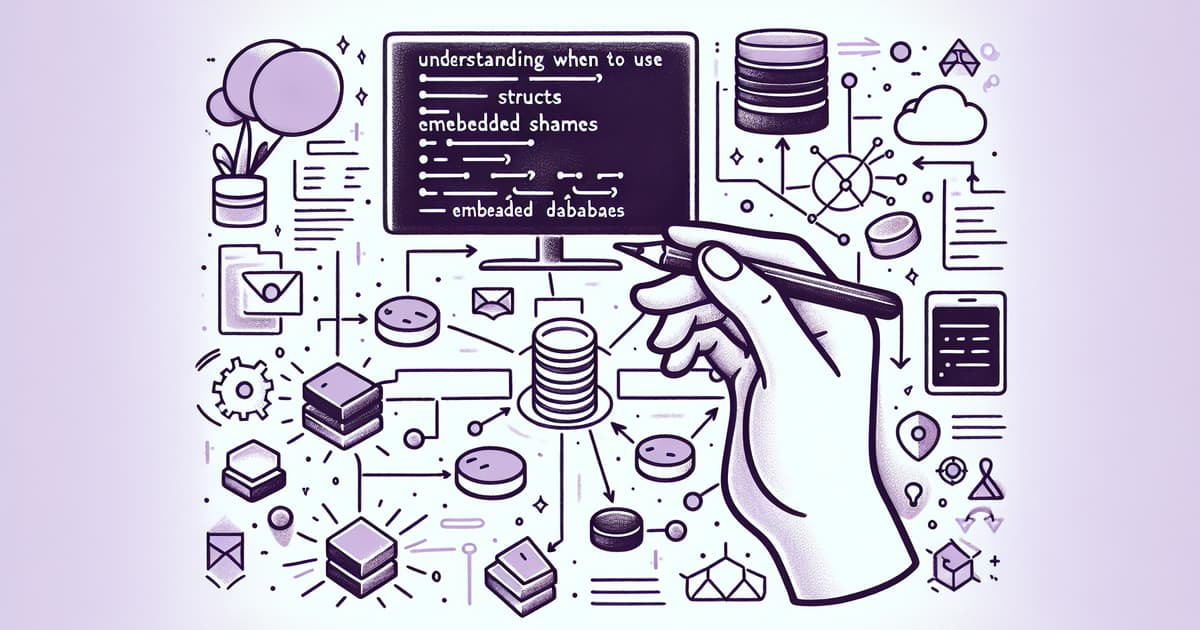We can't find the internet
Attempting to reconnect
Something went wrong!
Hang in there while we get back on track
Ecto

Elixir's dynamic and functional nature, along with the Ecto library, makes it an ideal choice for building a variety of applications requiring database interactions. Ecto provides a structured schema and query language that facilitates the seamless integration of database operations within Elixir applications. For instance, whether it's experimenting with geocoding features or handling complex database migrations in a production environment, Ecto offers the tools and flexibility needed for developers to implement robust solutions to data-related challenges. Its compatibility with databases, combined with Phoenix and LiveView, allows the creation of modern web applications that rival conventional JavaScript frameworks.
Observers of the BEAM runtime have praised Elixir's tools for monitoring and debugging, highlighting their effectiveness in maintaining application health and performance. Advanced features such as managing resource authorization or implementing multi-tenant environments also underline the capabilities of Elixir and Ecto to handle sophisticated requirements. Specifically, developers have leveraged Ecto to run large-scale, zero-downtime migrations, indicating how vital precise management and low-risk strategies are for such operations.
When it comes to testing, Elixer presents robust options. Techniques for testing external databases or simulating user authentication and authorization in multi-tenancy setups are just a few examples of how Ecto's flexibility aids developers. Adding to this, the practical deployment experiences shared for handling large data volumes with system resources such as SQLite and leveraging Elixir's efficiency, reinforce the language's standing in web and database-related tasks. Moreover, the ability to interleave Elixir's unique features like macros and telemetry for metaprogramming and observability respectively, only adds to its appeal among software developers.
Apart from the backend utility, Elixir, with libraries such as LiveView and Nerves, has also ventured into the realm of real-time applications and energy management platforms. The resilience and fault tolerance inherent in its design have been key in distributing workloads and managing infrastructure effectively. The educational progress in Elixir is noteworthy, with new resources and community insights constantly emerging to support both beginner and experienced developers alike. The discussions around Elixir at conferences and in articles provide a glimpse into the vibrant ecosystem that continues to evolve and broaden the applicability of this modern language across various domains.

Understanding Phoenix and Ecto for Backend Development
This talk explores how Phoenix and Ecto guide backend engineers towards best practices in application design and architecture.

Transforming Legacy Systems to Elixir Incrementally
In this talk, the speaker discusses the transition to Elixir, highlighting challenges and solutions faced in modernizing outdated software systems.

Exploring Ecto Internals with a Custom Git Adapter
In this talk, the speaker explores creating a custom Ecto adapter for Git repositories, emphasizing learning through unconventional methods.

Identifying Duplicate Records in Phoenix Applications Using Ecto
Detecting duplicate records is a common maintenance task in Phoenix applications. This article explains how to do it using Ecto queries.

Introducing Zoi: Elixir's Answer to Schema Validation Inspired by Zod
Paulo Curado discusses Zoi, a new Elixir library for schema validation inspired by Zod, targeting improved ergonomics and ease of use in the Elixir ecosystem.

Common LiveView Form Pitfalls and Their Solutions
John Curran discusses three frequent mistakes encountered in LiveView forms and their solutions. These issues include slow forms due to scattered logic, a brittle system that couples UI and database schema, and users facing issues submitting valid data.

Utilizing Ecto Types in Elixir for Improved Code Maintenance
At Mimiquate, the focus is on enhancing the clarity and maintainability of Elixir code through the use of Ecto Types, which simplify data handling between Elixir and databases.

Optimize Ecto Query Performance by Controlling Field Loading
The author discusses how loading large jsonb fields in Ecto can slow down applications and introduces the `load_in_query` option to optimize performance.

Transforming Outdated Software to Elixir Gradually
Recorded at ElixirConf EU 2025, this talk by Anita Ludermann discusses the journey of modernizing an outdated software system using Elixir.

Optimizing Complex Ecto Queries for Improved Capacity
This talk explores how to optimize complex Ecto queries to increase capacity for high-traffic applications, as demonstrated by the Axios mobile app before the 2020 election.

Understanding the Coordination Challenge in the Ash Framework
Joseph Koski discusses the Ash Framework's novel approach to coordinating various libraries in the Elixir ecosystem instead of imposing a rigid stack structure.

Efficiently Managing Large Datasets with Ecto in Elixir
Aestimo Kirina discusses the importance of managing bulk data operations in Elixir using Ecto, highlighting the performance limitations of single-record inserts and the benefits of batch processing.

A Journey Through Migrating an Elixir App to the Ash Framework
The author explores the process of migrating an existing Elixir application to the Ash Framework, sharing insights and steps taken during the transition.

Recap of ElixirConf EU 2025: Highlights from Permit Authorization Talk
From an attendee perspective, this content reflects on the ElixirConf EU 2025, where insights on the Permit authorization project and the author's experience as a speaker are shared.

Implementing Authorization and Access Control in Elixir Applications
In this talk, the speakers share lessons learned from implementing authorization, permission management, and access control in various applications across different industries, including robotics and healthcare.

Setting Up Real-Time Monitoring for Phoenix Apps with PromEx and Grafana
This article discusses the importance of observability in Phoenix applications using Prometheus metrics and the PromEx library for integration with Grafana.

In-depth Guide to Structs and Ecto Embedded Schemas in Elixir
Nikola Begedin explores the details of structs and embedded schemas in Elixir, delving into their functionality and advantages over regular maps.

A Quick Overview of Caller Tracking in Elixir
Alex Martsinovich discusses caller tracking in Elixir, a convention that helps identify related processes and manage access to owned resources in tests.

Implementing Artist Associations in Phoenix Music App
In this article, we learn how to refactor an album's artist field into a proper database association using Ecto in a Phoenix application.

Modernizing Software with Elixir: A Journey from Legacy to New Solutions
Anita Ludermann discusses transitioning from legacy systems to Elixir in 2023, focusing on incremental improvements in software engineering.

Overview of Drops.Relation: A New High-Level API for Ecto
This article introduces Drops.Relation, a new library for Elixir that simplifies database interactions with Ecto by providing high-level abstractions.

Exciting Updates on LiveView 1.1 and Elixir's Popularity
ThinkingElixir.com reports on the release of Phoenix LiveView v1.1 with new features and Elixir's recognition in the Stack Overflow Survey.

Launch of Drops.Relation for Simplifying Database Relations in Elixir
Peter Solnica introduces Drops.Relation, a new library that simplifies database interactions in Elixir by providing a high-level API with automatic schema inference and composable queries.

Understanding Ecto's on_replace and Using Deferred Constraints
by Paweł Świątkowski This article discusses a challenge faced when using Ecto for handling database associations and ensuring uniqueness with ordered steps in a process.

Discussion on the Launch of Phoenix.new and Elixir Updates
News includes the public launch of Phoenix.new - a revolutionary AI-powered development service for Phoenix, details on Ecto v3.13, Nx v0.10 improvements, and ElixirConf US announcements.

Launch of AI-Powered Phoenix Development Service
ThinkingElixir.com shares news about the launch of Phoenix.new by Chris McCord, highlighting advancements in the Elixir ecosystem including Ecto v3.13 and Nx v0.10.

Enhancing Ecto Monitoring with Baseline Metrics and Alerts
In this article, Aestimo Kirina delves into advanced techniques for monitoring Ecto in Elixir applications using AppSignal. It builds upon previous discussions about basic setup and focuses on establishing meaningful metrics.

Exploring Upcoming Features in Permit for Elixir Authorization
This article discusses future developments in Permit, an Elixir authorization library, focusing on new features, optimizations, and experimental ideas to enhance its functionality in authorization workflows.

Building Invitations and Collaborator Management in a Phoenix LiveView App
[series] In this video, we add invitations and collaborator management features to the budgie app using Phoenix LiveView.

Integrating Google Sheets with Elixir's Phoenix Framework
This article discusses how to transition data from Google Sheets into a Phoenix web application, demonstrating data extraction, processing, and display using Elixir and Google APIs.

Advanced Techniques for Nested Forms in Phoenix LiveView
In this article, the author discusses advanced techniques for creating and handling nested forms in Phoenix LiveView, focusing on usage with the Coox app example.

Building a Budget Tracking App with Phoenix LiveView and Ecto
[series] In this episode, we create a dedicated budget period view and implement advanced database aggregation to calculate rolling balances across budget periods!

Exploring Transaction Handling with Ecto in Elixir
Today we're going to look at how Ecto, Elixir's first-choice database access library, handles relational (SQL) database transactions.

Monitoring Ecto in Elixir Applications with AppSignal
Aestimo Kirina introduces the importance of monitoring Ecto in Elixir applications for better database performance and provides a guide on how to set it up using AppSignal.

Creating a WYSIWYG Editor in LiveView with S3 Image Uploads
In this tutorial, you'll learn how to create a WYSIWYG editor with image insertion that automatically uploads images to an S3 bucket while using LiveView.

Exploring LiveDebugger and Phoenix 1.8 in Elixir Community News
In this episode, the podcast covers the release of Phoenix 1.8.0-rc and features an interview with Krzysztof Nalepa about LiveDebugger.

Exploring LiveDebugger for LiveView Debugging
ThinkingElixir.com covers the Phoenix 1.8.0-rc release and interviews Krzysztof Nalepa about LiveDebugger, a tool for debugging LiveView states.

Understanding When to Use Structs and Embedded Schemas in Elixir
Gabriel Perales discusses the differences between structs and embedded schemas in Elixir, highlighting their distinct use cases for data modeling and validation.

Understanding Multitenancy in the Ash Framework
This article discusses the implementation of multitenancy in the Ash Framework, highlighting its importance for data security in multi-customer applications.

Exploring Python Integration with Elixir
In this episode, we discuss the release of Elixir 1.18.2 and its enhancements, the introduction of a new experimental SQL sigil for Ecto, and features from a recent talk by Saša Jurić. Additionally, we dive into PythonX, a new library that allows execution of Python code within Elixir.

Exploring New Features in Elixir and Python Integration
This episode covers the latest updates, including Elixir 1.18.2, a new SQL sigil for Ecto, and an interview about the PythonX library facilitating Python execution in Elixir.

Customizing the Phoenix Boilerplate for Better Page Titles and Queries
This article provides an overview of changes made to the default Phoenix project boilerplate for enhanced title handling and soft-deletion in queries.

Building a Budget Tracking App with Phoenix LiveView
[series] Build a complete budget tracking app in Phoenix LiveView! This episode covers transaction modeling, Ecto enums, and more.

Changing Field Types in Ecto Embedded Schemas: A Migration Guide
This article provides a guide on changing the field type from a string to a list of strings in an Ecto embedded schema, addressing both code and migration challenges.

Implementing Soft Deletes and Audit Logging in PostgreSQL with Ecto
Dan Schultzer discusses implementing soft deletes in PostgreSQL using Ecto, focusing on creating an audit log for deleted records.

Using Ecto and PostgreSQL for Effective Chart Data Normalization
Dan Schultzer discusses methods for preparing datasets for charts in Phoenix applications, emphasizing the importance of properly normalized data.

Creative Tricks and Techniques with Ecto for Clickhouse
In this article, the author discusses various creative techniques learned while using Ecto, particularly in the context of migrating analytics from Snowflake to Clickhouse.

Creating Interactive Data Tables using AG Grid with Phoenix LiveView
This article discusses how to integrate AG Grid, a robust JavaScript data grid library, with Phoenix LiveView to build advanced and interactive data tables, offering features like dynamic filtering and column management.

Handling Time Zones in Ecto for Event Dates
Milad discusses the challenges of storing event dates with time zone information in a database using PostgreSQL and Ecto.

A Guide to Translating Ecto Changeset Errors in Phoenix Applications
This article discusses how to properly translate Ecto changeset errors in Phoenix applications, focusing on best practices for localization.
© HashMerge 2026